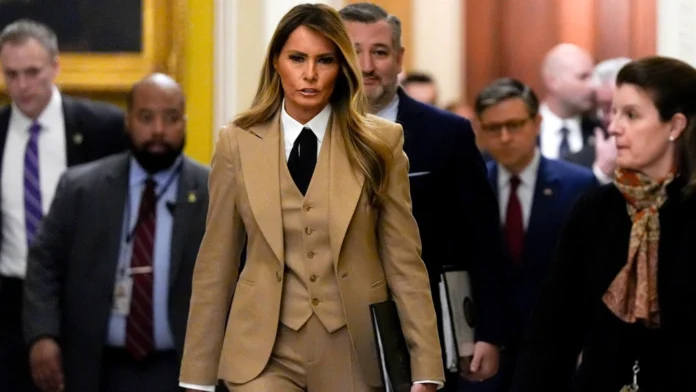A Contest at the Crossroads of Tech and Politics
Melania Trump has announced a new government-sponsored artificial intelligence (AI) contest for K-12 students, pitched as an opportunity to spark innovation among America’s youngest learners. While the initiative has been welcomed by some as a fresh way to inspire student interest in STEM, critics argue it could double as a political tool to bolster the Trump administration’s influence in education.
The Contest Framework
The “AI for the Future” challenge invites students from kindergarten through high school to develop creative AI projects addressing issues such as climate change, healthcare, and civic engagement. Supported by federal education funds and private-sector tech partnerships, the contest promises scholarships, national recognition, and the chance to present projects in Washington, D.C.
According to Melania Trump, the goal is to “empower young Americans to think boldly, solve real-world problems, and ensure our nation leads in technological innovation.”
Potential Benefits for Students
Educators acknowledge that the contest could encourage broader engagement with STEM disciplines, especially in underfunded districts where students rarely have access to cutting-edge technology.
- STEM teacher in California: “This could expose kids to AI concepts early on, something most schools don’t cover until college.”
- High school sophomore contestant: “I’m excited because it feels like my ideas matter. AI is shaping the world, and this gives us a way to be part of it.”
By tying prizes to scholarships, the contest also creates pathways for students from diverse socioeconomic backgrounds to gain recognition and support.
The Political Dimension
Despite the enthusiasm, critics highlight the contest’s political undertones.
- Some educators question why the initiative is framed around Melania Trump rather than a broader bipartisan education effort.
- Civil liberties advocates argue that showcasing student projects in Washington could blur the line between educational opportunity and political theater.
- Skeptics warn that the program could be used to portray the administration as champions of youth innovation while sidelining deeper issues such as underfunded schools or inequities in tech access.
“Whenever education initiatives come directly from the White House, we have to ask whether the goal is learning or messaging,” said Dr. Henry Carter, an education policy analyst.
Student and Educator Reactions
Feedback from classrooms across the country reveals both excitement and concern.
- Middle school teacher in Texas: “It’s a great way to inspire kids, but if this turns into a photo-op for the administration, the educational value will be lost.”
- High school senior in New York: “I’ll enter the contest, but I don’t want my work to be used as propaganda. This should be about us, not politics.”
The duality of hope and hesitation underscores the contest’s delicate position at the intersection of education and political branding.
The Bigger Picture: AI and the Classroom
Beyond the contest itself, the initiative highlights a growing debate over how AI should be introduced into K-12 education. Proponents say early exposure is vital for preparing students for future jobs, while critics stress the need for ethical frameworks and balanced curricula to avoid over-commercialization or politicization of education.
Melania Trump’s contest, whether successful or not, has sparked conversations about who gets to shape the narrative of America’s AI future — and for what purpose.
Conclusion — Innovation or Instrument?
Melania Trump’s AI contest for K-12 students walks a fine line between genuine innovation and political messaging. While it undeniably creates new opportunities for young learners to engage with AI, the framing and sponsorship raise legitimate concerns about political influence in education.
As projects roll in and winners are celebrated, the contest will serve as a revealing test case: Can a White House-backed initiative foster authentic student innovation, or will it be remembered as a polished form of propaganda dressed in the language of STEM?




